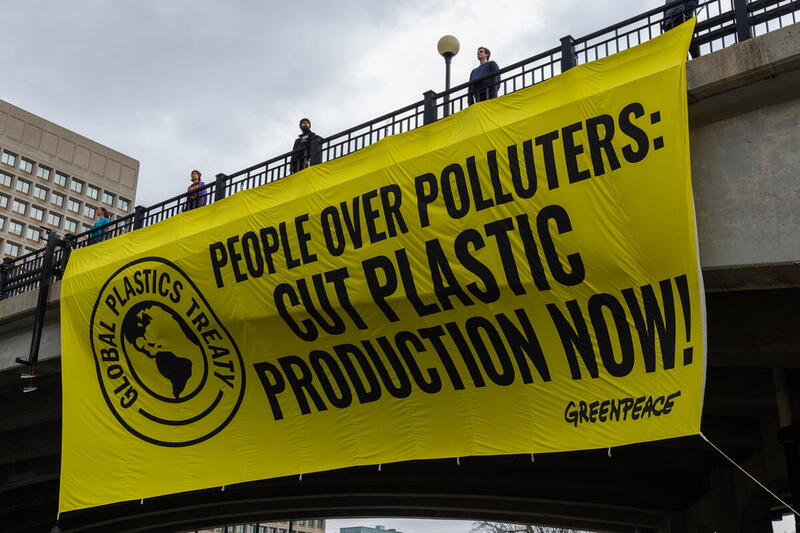Dear Mayors,
Scientific consensus of currently observed and projected future climate and biodiversity impacts clearly calls for the rapid transformation of our society at all scales and across all sectors, in order to maintain a safe climate and planet for the future of humanity.
City leaders play a crucial role in advancing innovative solutions that improve the well-being of citizens while contributing to maintaining a safe climate and planet for future generations (1). One such form of innovative solutions relate to urban food policies, which offer win-win options to improve public health in urban centres and at the same time greatly contribute to reducing climate emissions both in rural and urban areas.
The greenhouse gas footprint of livestock products is approximately 10–100 times greater than plant-based foods (2). Reducing over-consumption of livestock products would greatly reduce the environmental impacts of food production (3). For example, it has recently been shown that a sixth of the carbon footprint of average diets in Europe is due to tropical deforestation emissions (4). Meat and dairy production require large amounts of feed which often is produced from cropland expanding into newly deforested land (5).
While hunger and under nutrition remain a critical global issue, malnutrition is increasingly becoming a problem: dietary changes from current diets to healthy diets are likely to potentially avoid about 10 million deaths per year (10.8–11.6 million deaths per year, a reduction of 19.0–23.6%) (6).
Studies show that it is not necessary for humans to become vegetarian or vegan to have significant impacts on climate change and food security – a shift globally towards healthy diets would greatly reduce the adverse environmental impacts of food production, and would also benefit human health (7).
City leaders all over the world are moving ahead with ambitious urban food policies.
New York City Mayor Bill de Blasio and Brooklyn Borough President Eric Adams recently announced that all 1,700 NYC public schools will serve meatless meals every Monday: more than 1.1 million students will have a vegetarian meal every week.
In Lille, France, the school menu offers two meals weekly without meat or fish a week in the canteens of its public schools. The Lille school district serves about 14,000 meals a day. Since 2014, the city of Lille already implemented one vegetarian menu per week in its canteens.
In Mexico, Veracruz’s “Come Consciente” program launched in April 2018 requires that all schools in the state of Veracruz (the second-largest state in Mexico) serve plant-based meals on Mondays.
In the coming days, hundreds of cities will take part in the Milan Urban Food Policy Pact annual conference in Montpellier, France, and the C40 annual conference in Copenhagen, Denmark. To create a future that is healthy for both citizens and the planet, we call on Mayors today to reduce meat in the meals served in our public canteens and to increase plant-based foods.
As scientists working for the public good, we are ready to provide you with further scientific evidence about these important topics during the forthcoming C40 and the MUFPP meetings and beyond.
Sincerely,
Pete Smith, Professor of Soils & Global Change, University of Aberdeen, UK. FRS, FRSE, FNA, FRSB
Bojana Bajželj, Researcher, Swedish University of Agricultural Sciences, Sweden
Andrew Balmford, Professor, University of Cambridge, UK
Sébastien Barot, Research Director, Institut de Recherche pour le Développement, France
Priska Baur, Researcher, Institute of Natural Resource Sciences, Switzerland
Laurent Bègue, Professor, University Grenoble Alpes / CNRS, France
Elena Bennet, Professor, McGill University, Canada
Leroux Benoît, Researcher, Université de Poitiers – GRESCO, France
Tim Benton, Professor, University of Leeds, UK
Mike Berners-Lee, Professor, Lancaster University, UK
Alberto Bernués, Researcher, Agrifood Research and Technology Centre of Aragon, Spain
Gilles Billen, Research Director, CNRS/Sorbonne University, France
Alberte Bondeau, Researcher, CNRS, France
Gilles Brunschwig, Professor, VetAgroSup, France
Sophie Caillon, Researcher, CNRS, France
Roland Cash, Researcher, Asclépiades, France
Isabelle Champion, Researcher, INRA, France
Yves Chilliard, Research Director, INRA, France
Wolfgang Cramer, Professor, CNRS (IMBE), France
Emilie Dardenne, Researcher, Université Rennes 2, France
Miguel Delibes, Professor, Doñana Biological Station / CSIC, Spain
Marion Desquilbet, Researcher, Toulouse School of Economics and INRA, France
Sophie Devienne, Professor, AgroParisTech, France
Julio Díaz, Researcher, Carlos III Institute of Health, Spain
Mari Cruz Díaz Barradas, Professor, University of Seville, Spain
Rodolfo Dirzo, Professor, Stanford University, USA
Marc Dufumier, Professor, AgroParisTech, France
Michel Duru, Researcher, INRA, France
Jan P. Ehlers, Professor, Witten/Herdecke University, Germany
Laure Emperaire, Researcher, Institut de Recherche pour le Développement, France
Eve Fouilleux, Research Director, CNRS – University Paris Est, France
Tara Garnett, Researcher, University of Oxford, UK
Rosemary Green, Professor, London School of Hygiene & Tropical Medicine, UK
Helen Harwatt, Researcher, Harvard Law School, UK
Matthew Hayek, Professor, New York University, USA
Hans R. Herren, Researcher, Biovision, Switzerland
Vincent Hilomen, Professor, University of the Philippines Los Baños, the Philippines
Elise Huchard, Researcher, CNRS, France
Hans-Peter Hutter, Professor, Medical University of Vienna, Austria
Frédéric Joly, Researcher, INRA, France
Frédéric Le Manach, Researcher, Bloom, France
Jens Lund, Professor, University of Copenhagen, Denmark
Jennie Macdiarmid, Professor, University of Aberdeen, UK
Raphaël Manlay, Researcher, AgroParisTech, France
Marie-Claude Marsolier-Kergoat, Researcher, CEA/Muséum National d’Histoire Naturelle, France
Sandrine Mathy, Researcher, CNRS, France
Adrian Müller, Researcher, Research Institute of Organic Agriculture, FiBL, Switzerland
Lucie Najak, Researcher, Inserm, France
Mercedes Pardo-Buendía, Professor, University Carlos III of Madrid, Spain
Jared Piazza, Researcher, Lancaster University, UK
Joseph Poore, Researcher, University of Oxford, UK
Prajal Pradhan, Researcher, Potsdam Institute for Climate Impact Research (PIK), Germany
William Ripple, Distinguished Professor, Oregon State University, USA
Marta Guadalupe Rivera-Ferre, Researcher, University of Vic-Central University of Catalonia, Spain
Elin Röös, Researcher, Swedish University of Agricultural Sciences, Sweden
Antonio Ruiz de Elvira, Professor, University of Alcalá, Spain
Peter Birch Sørensen, Professor, University of Copenhagen, Denmark
Marco Springmann, Researcher, University of Oxford, UK
David Suzuki, Professor Emeritus, University of British Columbia, Canada
Nicolas Treich, Researcher, Toulouse School of Economics and INRA, France
Fernando Valladares, Professor, Consejo Superior de Investigaciones Científicas, Spain
Isabelle Veissier, Researcher, INRA, France
Jérémy Vendé, Researcher, AgroParisTech, France
Paul West, Researcher, Global Landscapes Initiative, Institute on the Environment, University of Minnesota, USA
Stephen Whybrow, Researcher, University of Aberdeen, UK
Note: Signatories speak on their own behalf, and not on behalf of their affiliated institutions.
(1) Bertoldi, P., Kona, A., Rivas, S. & Dallemand, J. F. 2018. Towards a global comprehensive and transparent framework for cities and local governments enabling an effective contribution to the Paris climate agreement. Current Opinion in Environmental Sustainability, 30, 67-74.
IPBES 2019. Summary for policymakers of the global assessment report on biodiversity and ecosystem services of the Intergovernmental Science-Policy Platform on Biodiversity and Ecosystem Services.
(2) Clark, M. & Tilman, D. 2017. Comparative analysis of environmental impacts of agricultural production systems, agricultural input efficiency, and food choice. Environmental Research Letters 12, 064016.
Poore, J. & Nemecek, T. 2018. Reducing food’s environmental impacts through producers and consumers. Science, 360: 987.
(3) Bajželj B., Richards K.S., Allwood J.M., Smith P., Dennis J.S., Curmi E. & Gilligan C.A. 2014. The importance of food demand management for climate mitigation. Nature Climate Change 4, 924–929.
Tilman, D. & Clark, M. 2014. Global diets link environmental sustainability and human health. Nature 515, 518–522.
(4) Pendrill, F., Persson, U.M., Godar, J., Kastner, T., Moran, D., Schmidt, S. & Wood, R. 2019. Agricultural and forestry trade drives large share of tropical deforestation emissions. Global Environmental Change, 56, 1-10.
(5) Smith, P. 2018. Managing the global land resource. Proceedings of the Royal Society B: Biological Sciences, 285: 20172798.
(6) Data from the latest Eat-Lancet Commission on Planetary Health: Willett, W., Rockström, J., Loken, B., Springmann, M., Lang, T., Vermeulen, S., Garnett, T., Tilman, D., DeClerck, F., Wood, A., Jonell, M., Clark, M., Gordon, L. J., Fanzo, J., Hawkes, C., Zurayk, R., Rivera, J. A., De Vries, W., Majele Sibanda, L., Afshin, A., Chaudhary, A., Herrero, M., Agustina, R., Branca, F., Lartey, A., Fan, S., Crona, B., Fox, E., Bignet, V., Troell, M., Lindahl, T., Singh, S., Cornell, S. E., Srinath Reddy, K., Narain, S., Nishtar, S. & Murray, C. J. L. 2019. Food in the Anthropocene: the EAT–Lancet Commission on healthy diets from sustainable food systems. The Lancet, 393, 447-492.
(7) Smith, P. 2018. Managing the global land resource. Proceedings of the Royal Society B: Biological Sciences, 285: 20172798.



